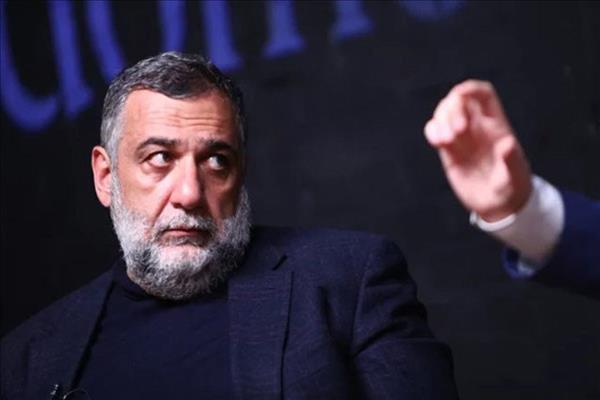
Vardanyan's Bleak Midwinter: Musings On What Is To Come

Orkhan Amashov read more
The crisis of power within the separatist clique in Karabakh seems to have been abated, albeit remaining distant from being resolved, with the overall state of affairs within the walls of the illegal 'NKR' structure remaining critically fragile under the cracking influence of the environmental vigil on the Lachin-Khankandi Road.
If, on 15 January, some reports in the Armenian media were definitively pointing to the imminent 'removal' of the self-styled 'first minister' Ruben Vardanyan, within the succeeding days, the tycoon clung to his perch, defiantly tweeting that he would not resign, with reports citing a last-ditch Russian intervention affecting the temporary reversal of his fortunes.
The reference point that led to the internal squabbles amongst the separatist forces, also causing rifts between them and Yerevan, seems to be the eco-protest organised by Azerbaijani environmentalists, triggered by the ongoing illegal exploitation of Karabakh's natural resources under the willfully blind eyes of the Russian 'peacekeepers'.
Although the peaceful demonstration has not caused any humanitarian disaster for the Armenian residents of the region, it nevertheless attracted attention to the sheer untenability of the present state of affairs within the framework of which the illegal presence of Vardanyan and fellow separatists under the Russian contingent would be maintained.
The eco-protest has delivered a pneumatic drill size blow to the Vardanyan project, wreaking havoc for the plan to illegally extract the region's mineral deposits, ensuring that awareness of the impossibility and implausibility of the creation of economic self-sufficiency for the separatists at the expense of Azerbaijani wealth, one of the attractions forming the crux of the cloud-cuckoo land viability of the Kremlin-sent tycoon's plans.
Baku's unmoving determination not to talk to Vardanyan has increased the sensibility amongst some Armenians of Karabakh that the so-called“first minister” was an irksome spoiler acting to the detriment of the region's population, with unrealistic blue sky secessionist ambitions that would result in further exacerbation of the situation.
Voicing this fear, some Pashinyan allies openly called for the tycoon's removal, observantly calling him a scoundrel of the highest order, with the slightly grounded Armenian Prime Minister suggesting the best possible mode of action for the separatist regime was to engage in dialogue with Baku and refrain from making provocative statements. The unrecognised and illegal“NKR” issued a statement, commenting that such a call was against their aspirations.
The rift between the illegal entity in Khankandi and Yerevan is believed to have a deeper and more substantial root, which is attributable to Pashinyan's fear that Vardanyan's true ambition is to capitalise on the separatist escapade to pave his path towards future ascendance to power in Armenia, with some analysts considering the design as being integral to the Kremlin's miserable strategy.
What has become the critical point within the crisis were calls for a“fresh election” for the separatists to form a new leadership. Vardanyan claimed this would serve the interests of Baku, with some commentators stressing that, in the case of such a scenario, the likely probability would be a complete vacuum of power, as Azerbaijan would never let such an illegal process on its territory reach its completion.
What seems to be the most credible reason affecting Vardanyan's present survival by skin of his teeth is that Russia may well have communicated to the regime in Khankandi that if a“new election” were to be held, no guarantees could be given as to its safe conduct. On the whole, for the Kremlin, its protégé may be expendable, but before shelving this project centred around his persona, it will need to insinuate a new scheme for which it might, at present, have been insufficiently resourceful.
In the meantime, Baku seems to be carefully observing the developments and consider possible formats of engagement with the local Armenian community, thereby giving impetus to dialogue as a part of a wider policy of its integration into the rest of the country. Such communication, if conducted efficiently with plausible consequences, will inevitably lead to the creation of an alternative power centre within currently Armenian-populated Karabakh, eviscerating the separatists, and culminating in direct Azerbaijani administrative control over the region.
The situation enveloping the Lachin-Khankandi Road has created narrowed scope for manoeuvrability for Yerevan, which is now compelled to call for direct Khankandi-Baku talks, trying, amongst other objectives, to give the separatists forces some legitimacy, despite this being inconceivable for Azerbaijan. What is, however, more significant in Yerevan's move is that, by limiting its formal involvement, it faintly, but not inadvertently, acknowledges the territorial integrity of its old adversary, albeit keeping open its options for a belated retraction.
At present, Project Vardanyan is still within its bleak midwinter, with an external succour providing a brief moment of relief with no clear perspective on the future. With Baku's coercive pressure unlikely to lose its momentum, the probable likelihood is that, in the forthcoming days, a new wave of frictions and factions inside the separatist clique will make the Kremlin reconsider its new mode and of behaviour, which will be influenced by continuously changing the ad hoc situational alliances within the fraught Moscow-Baku-Yerevan triangle.
Neil Watson, British Journalist, commented:“The sword of Damocles hangs over this unhappy triangle. The ultimate objectives of Yerevan and its ally Russia remain vague, other than tentative attempts to retain the status quo. Internal strife amongst and between Armenia and its puppet in Karabakh can only help the Azerbaijani cause and exacerbate the application of some much-needed common sense.”
---
Legal Disclaimer:
MENAFN provides the
information “as is” without warranty of any kind. We do not accept
any responsibility or liability for the accuracy, content, images,
videos, licenses, completeness, legality, or reliability of the information
contained in this article. If you have any complaints or copyright
issues related to this article, kindly contact the provider above.






















Comments
No comment